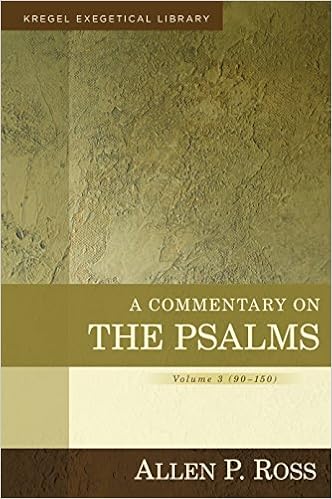
A Commentary
on the Psalms Vol. 3 (90-150) by Allen P. Ross
Anyone who undertakes a commentary series on the Psalms,
much less a three volume series on the Psalms should be commended. Allen P. Ross,
Professor of divinity at Beeson Divinity School has accomplished such a feat,
with an admirable amount of focus, vision, and challenge to his readers. This third volume by Kregel Academic focuses
on Psalms 90-150. Each psalms begins
with an introduction, a section on composition, exegetical analysis, expository
commentary, message and applications.
The value of this kind of commentary comes in the painstaking exegetical
analysis of the Hebrew text and in seeking out each psalm’s main theme.
Ross weaves together insights from other scholars as
well as his own interpretation, which comes to the foreground in his analysis
of Psalm 103:4b. Ross writes, “The
psalmist now declares that God crowns the believers with loyal love and tender
compassion. By using “who crowns you”,
the psalmist is signifying how God honors his people-he makes them feel like
kings, as Anderson paraphrases it (p.713) (234).” Ross goes onto indicate that these attributes
of love and compassion were imparted to humans in creation, yet restored in
redemption. What is helpful in Ross’
analysis is the pictures that he draws out from the words of the psalmists, and
understanding one as kingly is just one of these examples.
In describing the blessings that flow from God to
believers in the context of Psalm 112, Ross gives us a healthy dose of realism
by stating, “In describing the blessings, however, the psalmist gives some
hints that they are not necessarily immediate or untroubled. The psalmist lives in darkness and needs
light; he has enemies and needs victory, he hears reports of disaster and must
remain steadfast (383).” The blessings
of God are not like a coke dispensing machine or a Pez dispenser that immediately
pops out one’s favorite drink or candy at the push of a button. No, there is often waiting involved with
blessing, and sometimes the blessing is in knowing that you lived a righteous
and just life for others. Ross carefully
gives us insight that even when blessings are given, “they are obligations for
the righteous (383).”
No doubt this is a hefty tome to read through, but it is
worth reading to grasp the beauty and wisdom of the last part of the Psalter.
T
hanks to Kregel Academic for the copy of this book in
exchange for an honest review.
Comments
Post a Comment